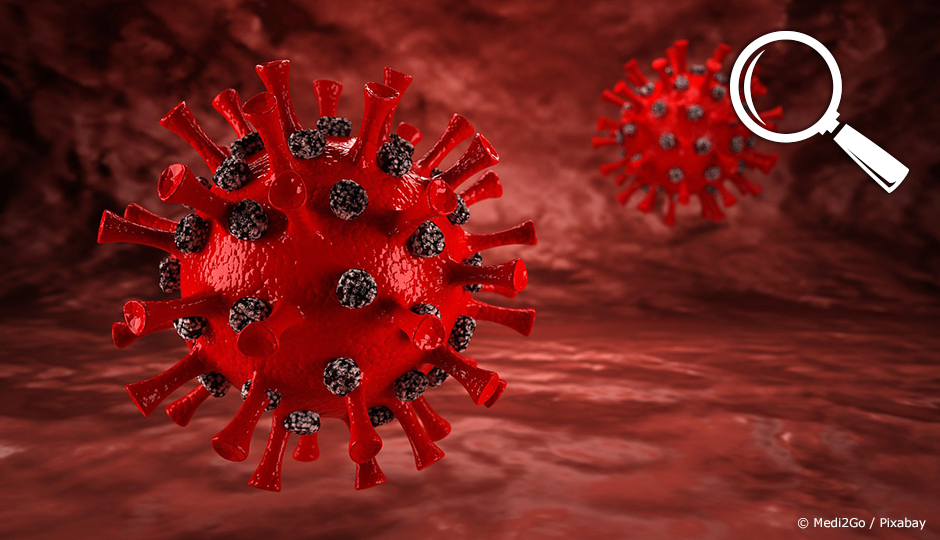Auteur : Agence Science Presse - Catherine Crépeau
All over the world, researchers and doctors are working around the clock to beat the coronavirus. With no vaccine in sight, they’re testing treatments or drugs. Chloroquine and its derivative, hydroxychloroquine, are often mentioned in the media. Some perceive them as miracle drugs because of their antiviral properties. But what’s the truth compared to other drugs with the same properties? The Détecteurs de rumeurs has identified 4 points you should bear in mind.
First of all, remember that two main approaches are currently being tested to fight SARS-CoV-2, the virus responsible for COVID-19. The first approach targets antiviral drugs to attack the virus directly. The second approach involves drugs like colchicine, which act on the immune system. The aim is to control the body’s inflammatory reaction to the virus. The Rumor Detector will devote a separate article to the second approach.
1) An antiviral isn’t a vaccine
To understand the purpose of antivirals, or any drug used for its antiviral properties, you need to know how a virus works. When a virus penetrates an organism — whether animal or human — it uses its host’s cells to multiply. Normally, this multiplication will provoke a defensive reaction by the immune system. However, with SARS-CoV-2, the immune system is facing an enemy it has never met. That’s why many patients don’t have a sufficient immune response. Their body can’t prevent the virus from multiplying, and their condition can worsen. In some cases, the runaway immune response triggers a strong inflammatory reaction, especially in the lung tissues. The resulting acute respiratory distress can lead to death.
The purpose of antivirals is to prevent the virus from entering the body. Or they can hinder the mechanisms the virus uses to multiply after it invades. Antivirals don’t have the power to eradicate the virus before it attacks the cells. Only a vaccine can do this. But antivirals can limit the amount of virus reproducing in the body, limiting its ability to do harm.
Generally, antivirals are more effective if they are administered shortly after a person is infected, or when symptoms appear. This lets them slow down replication when the virus is still at low levels. But in the current pandemic, an indeterminate number of contagious individuals have no symptoms. That’s why the effectiveness of antivirals in the population is uncertain.
2) Antivirals that encourage hope
We’ve heard a lot about chloroquine, used against malaria. Its derivative, hydroxychloroquine, is used against lupus and rheumatoid arthritis. Interest was revived in mid-February when Chinese researchers suggested these drugs had an antiviral effect against SARS-CoV-2, in vitro. In France, Didier Raoult and his team concluded that hydroxychloroquine is effective in association with the antibiotic azithromycin. But many scientists have noted the methodological weaknesses of these studies. They point out that the results haven’t been published in a scientific journal with independent peer review.
However, there are other antivirals. According to a review of potential drugs published on April 13 in the Journal of the American Medical Association (JAMA), the most promising treatment at present is remdesivir, a drug developed against Ebola. This is due to remdesivir’s powerful in vitro activity against several coronaviruses, including SARS-CoV-2.
A study published April 10 in The New England Journal of Medicine reports a clinical improvement in two thirds of the 53 hospitalized patients who received remdesivir. According to Stat News, a University of Chicago study showed that the drug seems to result in a rapid reduction of fever and respiratory symptoms. These results only concern 125 of the 2400 participants severely affected by COVID-19.
A placebo-controlled clinical trial including a thousand patients also showed encouraging results. The preliminary data, published on April 29, indicates that remdesivir helps hospitalized patients recover 31% faster. However, we must wait for the conclusions of these trials to decide on this molecule’s effectiveness.
Ivermectin is used to treat parasitic infections, such as scabies or onchocerciasis (an eye and skin disease caused by a worm). This drug reportedly reduced the viral load by 99.98% in less than 48 hours during in vitro tests. According to the Australian researchers who conducted the trail, Ivermectin slows proliferation of the virus enough to allow the immune system to regain control. However, these results were only obtained in vitro.
The data on the combination of two anti-HIV drugs, lopinavir and ritonavir, is based on case reports and small-scale studies. However, they suggest a limited role for the treatment and many adverse effects, especially gastrointestinal disorders.
The effectiveness data with ribavirin for other coronaviruses (SARS and MERS) is inconclusive. Along with its substantial toxicity, this suggests it has limited value for treatment of COVID-19.
3) There are risks
Several experts warn against the premature use of antivirals, due to their potentially severe adverse effects. The JAMA article gives an overview. Among these effects, it mentions cardiac arrhythmia, hypoglycemia, neuropsychiatric effects (agitation, confusion, hallucinations, paranoia) and aggravation of liver damage.
An overdose of chloroquine or hydroxychloroquine can trigger convulsions, coma and cardiac arrest. On March 30, the French National Agency for Medicines and Health Products Safety (ANSM) warned against some treatments tested against COVID-19. ANSM noted that hydroxychloroquine or Kaletra (an antiretroviral associating lopinavir/ritonavir) could produce severe adverse effects. According to ANSM, “in no case” should it be used in self-medication.
Doctors also fear a shortage of hydroxychloroquine for patients who need it to treat their rheumatoid arthritis. The molecule is listed by Drug Shortages Canada.
4) Over a hundred trials are in progress
Many trials of all these antivirals are in progress all over the world. The Clinical Trials website identifies over a hundred studies with the key words “COVID-19” and “antiviral”. They particularly concern chloroquine, hydroxychloroquine, the lopinavir/ritonavir combination, remdesivir, ribavirin and favipiravir.
The McGill University Health Centre is conducting one of these studies. It is seeking to evaluate whether hydroxychloroquine can prevent people from contracting COVID-19 after exposure to the virus. It also wants to know if it can reduce complications and deaths linked to the disease.
This product is also one of those tested in the Discovery trial conducted with 3200 hospitalized European patients. Also being tested are remdesivir, a lopinavir-ritonavir combination, and the combination associated with interferon beta, used in treating multiple sclerosis.
This trial will complete the data that will be gathered by Solidarity, an international clinical trial. This trial, overseen by the World Health Organization, focuses on the same molecules.





